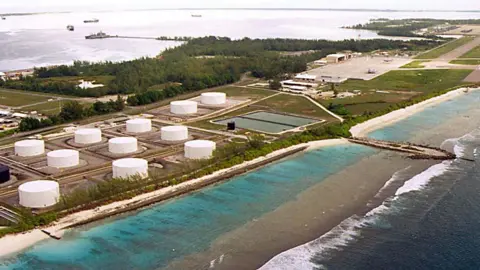The United Kingdom is poised to sign a significant agreement with Mauritius regarding the Chagos Islands, a move that could redefine the political landscape in the Indian Ocean. The deal, which is set to be signed by UK Prime Minister Sir Keir Starmer, hands over sovereignty of these strategically important islands to Mauritius. In return, Mauritius will permit the US and UK to operate a crucial military base on one of the islands, Diego Garcia, for an extended period of 99 years, alongside a multi-billion-pound financial arrangement.
This development comes as a continuation of negotiations that began during the tenure of Mauritian Prime Minister Pravind Jugnauth, who initially brought the proposal to the forefront in October of the previous year. However, the process faced interruptions due to political changes in both Mauritius and the United States, particularly after the election of Donald Trump, whose aides were given time to review the implications of the deal. The specifics of the agreement will be formalized during a virtual ceremony scheduled for Thursday, which will include representatives from the Mauritian government.
The Chagos Islands, also referred to as the British Indian Ocean Territory (BIOT), have a contentious history marked by colonization and geopolitical maneuvering. These islands were detached from Mauritius in 1965 when Mauritius was still under British rule. The UK purchased the islands for a mere £3 million, yet Mauritius controversially argues that this was not a legitimate transfer of land, claiming it was coerced as part of its independence negotiations in 1968.
In light of increasing international scrutiny and pressure from various United Nations bodies that have validated Mauritius’ claims to sovereignty, the British government faces mounting challenges in maintaining control over the archipelago. The last Conservative administration had already initiated negotiations regarding the legal status of the islands, although it has faced criticism from opponents, including members of the Reform UK party, which denounces the Labour government’s approach as overly lenient.
Despite the transitional agreements, concerns regarding national security remain prominent. The military base on Diego Garcia is considered vital for UK and US military operations in the region. Defence Secretary John Healey reiterated the significance of this base, describing it as essential for national security, especially in the context of the UK’s relationship with the US. The signing of the deal comes at a time when the Labour government is advocating for the return of control to Mauritius as a means to guarantee the future of the military base, citing it as strategically aligned with UK national interests.
In addition to the military implications, the financial ramifications of the deal have not been ignored. While the British government has yet to disclose the specific costs involved, expectations are that the payments could amount to billions, particularly as they will need to enlist the support of UK taxpayers. The deal’s magnitude and potential long-term implications will be elaborated upon in the House of Commons following the signing ceremony.
In summary, the signing of this deal represents a pivotal moment in the UK-Mauritius relationship and reflects the broader geopolitical dynamics at play in the Indian Ocean. While it symbolically signifies an end to colonial legacies, it also functions to secure military interests crucial for both the UK and US. This agreement serves as a reminder of the complex interplay between historical grievances and contemporary strategic necessities that shape international relations today.



